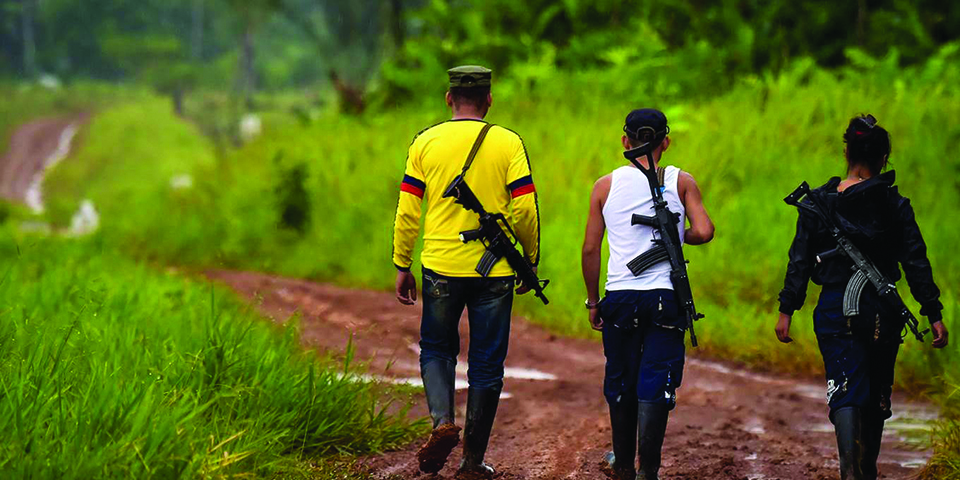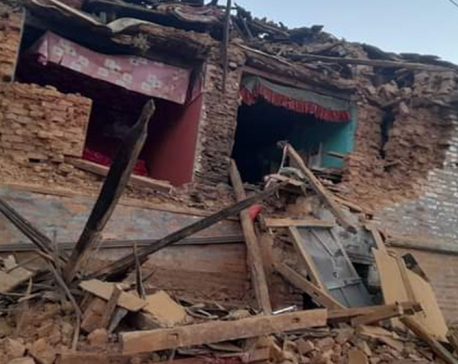
OR

Colombia’s government has so far achieved only 18.5 percent of the reforms, laws, and promises stipulated by the peace accord
MADRID – In 2016, Colombia’s government reached a historic peace agreement with the Revolutionary Armed Forces of Colombia (FARC), ending a 52-year-old war that had killed more than 265,000 Colombians and displaced another seven million. The deal has been hailed as a new model for resolving seemingly intractable conflicts. But it is now being tested like never before.
Eradicating the root causes of such a protracted conflict would be difficult enough in the best of times. With Iván Duque Márquez taking over Colombia’s presidency, however, it will become much more so. Duque’s mentor was former President Álvaro Uribe, the political nemesis of Duque’s immediate predecessor, Juan Manuel Santos, the architect of the peace accord.
Disowning the deal
Already, Duque has refused to recognize key pillars of the deal, beginning with the FARC’s status as a legitimate political party that can participate in democratic elections. He has also rejected the Special Jurisdiction for Peace (JEP), a new extrajudicial court system created as part of the deal to manage transitional justice—the legacy of abuses by FARC guerrillas and the right-wing paramilitary organizations that fought them.
Colombia’s powerful conservative establishment has never been happy with the liberal spirit underlying the JEP, which aims to be more restorative than punitive, putting the victims—and the truth—front and center. The results might include reparations and acknowledgments of perpetrators’ guilt. But top FARC leaders would be able effectively to avoid prison sentences for their crimes.
Colombia’s Senate, however, has now removed from the JEP’s jurisdiction high-ranking military, business, and political figures suspected of colluding with the right-wing paramilitaries. The senators argue that the military needs a new tribunal with “impartial justices,” rather than the “leftists” of the JEP. In this manner, the deal was undermined before Duque was even inaugurated.
The good news is that thanks to a ruling by Colombia’s Constitutional Court, the president cannot substantively change the peace deal’s terms. But Duque could still weaken the agreement by denying the resources and political attention needed to implement it. The question then becomes whether he will choose a pragmatic approach, even if it means clashing with Uribe, just as Santos did.
Even without Duque actively undermining the peace agreement, however, the implementation challenges are profound. While FARC has officially demobilized, some FARC fronts have refused to give up the fight. They are now locked in an all-out war with paramilitary groups, some of which arose from the right-wing paramilitaries that demobilized in the early 2000s; the National Liberation Army (ELN), a Marxist militia that resisted Santos’ offer of a separate peace deal; and criminal bands vying to take over FARC’s illicit economy.
That economy included coca, the raw material for cocaine. Most of the fight for control of this and other illicit assets is concentrated in about one-quarter of the country’s municipalities, just five percent of which are under state control. Given Colombia’s massive size, the country’s peace and stability have always depended on the state’s ability to provide services and institutional support to historically marginalized areas.
Now, areas that have been evacuated by FARC lack such support, leaving them vulnerable to renewed volatility, reflected in a rise in politically motivated assassinations. Small landowners, intimidated by the violence, are now being forced to sell at bargain prices the stolen lands they recovered as part of the Law of Victims and Land Restitution—another pillar of the peace agreement—to major agro-industrial companies.
Such companies are also gaining access to areas of the Colombian Amazon evacuated by the FARC—areas covered in virgin forests that are now in danger of being destroyed. Last year alone, Colombia lost almost a half-million hectares of forest cover—a 46 percent increase over the previous year. The destruction of this vital ecosystem threatens to accelerate climate change.
Rooting for peace
These are serious challenges, which can be overcome only with deep and long-term structural reforms. But that is no excuse to give up on the peace deal. After all, such challenges were to be expected: unlike peace deals between functioning states—which would focus on, say, delimiting borders—agreements with non-state actors are virtually always followed by complex and protracted state-building efforts.
Consider the Good Friday Agreement that brought peace to Northern Ireland after three decades of violence. The deal was signed in 1998, but it was only seven years later that the Irish Republican Army agreed to disarm. Another two years elapsed before Protestants and Catholics reached a definitive power-sharing agreement. When power-sharing governments have faltered, the UK government has temporarily reimposed direct rule.
Like the Good Friday Agreement, Colombia’s peace agreement is based on a simple bargain: political participation for disarmament. But the only way to implement the deal is to reconstruct the country’s abandoned rural periphery—a highly complex task made all the more difficult by resistance from vested economic interests and the conservative politicians who serve them.
Owing partly to such resistance, Colombia’s government, according to the International Commission on Human Rights Verification, has so far achieved only 18.5 percent of the reforms, laws, and promises—from economic reparations and security guarantees to assistance to farmers who agreed to end coca production—stipulated by the peace accord. Duque’s presidency will be judged by his willingness to challenge vested interests and advance the peace process.
The peace deal is not perfect. But the fact remains that Santos bequeathed to his successor a country that is free of the scourge of the FARC insurgency and on the path toward lasting peace, not to mention a roadmap for a potential peace deal with the ELN. He also laid the groundwork for rural reforms that, if completed, would produce nothing less than an agrarian revolution in Colombia. Duque must not waste a golden opportunity to deliver to his country the durable peace and stability of which Colombians have long dreamed.
Shlomo Ben-Ami, a former Israeli foreign minister, is Vice President of the Toledo International Center for Peace. He is the author of Scars of War, Wounds of Peace: The Israeli-Arab Tragedy
© 2018, Project Syndicate
www.project-syndicate.org
You May Like This

Nepal's Seismic Struggle and Ongoing Recovery Dynamics
Nepal's seismic vulnerability is highlighted by its history of frequent and devastating earthquakes. Over the past 52 years, from 1970... Read More...

Equality under the Law: Examining Legal Principles across Different Scales
The suspension of Nepali Congress (NC) MP Tek Prasad Gurung, who was found guilty on corruption charges, has confirmed that... Read More...

Cotiviti controversy mars Investment Summit in Nepal
Cotiviti Nepal is accused of leaking Rs 10.36 billion (about $84 million) in money, according to a complaint lodged by... Read More...




Just In
- Health ministry to conduct ‘search and vaccinate’ campaign on May 13
- Indian customs releases trucks carrying Nepali tea, halted across Kakarbhitta
- Silent period for by-election to begin from midnight
- SC issues short-term interim order to govt and TU not to take immediate action against TU legal advisor Khanal
- National consultation workshop advocates to scale up nutrition smart community in Nepal
- Patan High Court issues short-term interim order to halt selection process of NTB’s CEO
- NEPSE inches up 0.15 points; daily turnover increases to Rs 2.53 billion
- Bagmati Govt mandates tri-lingual signboards in offices















Leave A Comment